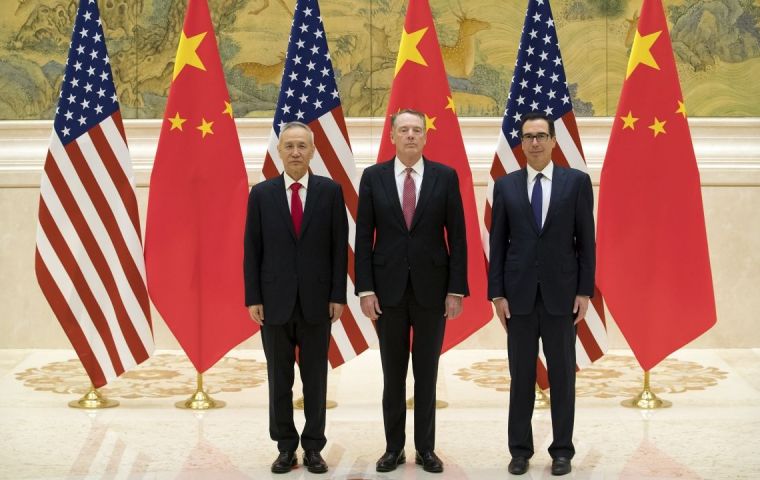MercoPress. South Atlantic News Agency
Chinese backtrack prompted Trump to announce raising tariffs next Friday
 “Over the course of the last week, we have seen an erosion in commitments from China,” US Trade Representative Robert Lighthizer told reporters
“Over the course of the last week, we have seen an erosion in commitments from China,” US Trade Representative Robert Lighthizer told reporters  Lightizer added that the Chinese delegation would still be coming to Washington for this week’s trade talks, which will now begin on Thursday
Lightizer added that the Chinese delegation would still be coming to Washington for this week’s trade talks, which will now begin on Thursday Top US trade officials said on Monday that China had backtracked on previous commitments made in talks, and that this reversal was what prompted President Donald Trump’s earlier announcement that the United States would raise tariffs on billions of Chinese goods next Friday.
“Over the course of the last week, we have seen an erosion in commitments from China,” US Trade Representative Robert Lighthizer told reporters in an afternoon briefing.
He added that the Chinese delegation would still be coming to Washington for this week’s trade talks, which will now begin on Thursday - a day later than previously scheduled.
But unless there is an agreement by Friday, the entire US trade team is unified in recommending to Mr. Trump that the US go ahead with tariffs, said Treasury Secretary Steven Mnuchin, who was also at the briefing.
A formal notice of the tariffs will likely be issued on Tuesday, and the tariffs will take effect at the stroke of midnight on Friday, said Mr Lighthizer.
Mr Trump announced on Twitter on Sunday that America’s tariffs of 10% on US$200 billion of Chinese goods will be raised to 25%, a hike originally scheduled for March but which he postponed on the basis of good progress at talks. He also threatened further tariffs on almost all other Chinese goods that remained untaxed.
His announcement took observers by surprise and sent markets into a tailspin, but Mr Lighthizer and Mr Mnuchin’s comments showed the impending tariffs as less an impulsive move by the President and more fuelled by frustrations arising from the deeper disagreements between Beijing and Washington. They also lessened doubts that the President had been bluffing.
The latest impasse also lowers the chances that the trade war can be resolved at this round of talks, dashing original hopes from White House officials and trade watchers that an agreement could be reached by the weekend.
Mr Mnuchin said the deal had been 90% done and that negotiators had been in the process of planning a summit between Mr Trump and Chinese President Xi Jinping. But over the weekend, China moved away from language in the agreement that would have changed it substantially, he added.
“We’re moving backward instead of forward, and in the President’s view, that’s not acceptable,” said Mr Lighthizer, without giving details on specifically what promises China had broken.
Mr Lighthizer and Mr Mnuchin said they had not spoken to Chinese vice-premier Liu He, Beijing’s lead negotiator, in the past 24 hours.
Mr Trump's tough stance on China has won plaudits from both the American left and the right, but the rare bipartisan support also makes it politically difficult for him to accept any watered down deal.
Republican senator Marco Rubio, who vied with Mr Trump for the presidency in 2016, wrote on Twitter on Monday that he was unsurprised that China was trying to go back on changes they had previously agreed to.
“For years, they have had counterparts so desperate for a deal they allowed them to get away with this,” he said in a swipe at previous Democrat administrations, and added that Mr Trump was “the first to ever pose a credible threat to walk away from a bad deal”.
The President's former chief strategist Steve Bannon, a China hawk, similarly urged him not to soften his stance against China and keep the tariffs, in a commentary published on Monday by The Washington Post.
Anything less than a great deal will subject Mr Trump to relentless criticism from the left wings of the Democratic party and leave him open to challenges from more right-wing Republicans, wrote Mr Bannon.
“For these reasons, the President’s best political option is not to surrender, but rather, to double down on the tariffs — they have been highly effective in pressuring the Chinese without harming the US economy.”




Top Comments
Disclaimer & comment rulesCommenting for this story is now closed.
If you have a Facebook account, become a fan and comment on our Facebook Page!